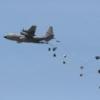Leaderboard
Popular Content
Showing content with the highest reputation on 12/28/2013 in all areas
-
Practice bleeding should end at all levels of PME. IDE should change so that AAD is masked at the major board, if you are not a select you are eligible to start the correspondance course, selects go in residence, both are masters degree programs. The first half of correspondance earns you IDE credit, the second year gets you the degree, AAD is unmasked at your 0-5 board. Either way, guys are de-incentivized from working on an AAD at an inappropriate time in their career, and given time to complete it for when it actually starts to matter. Plus it gives the AF a bit of control of the type of masters guys get, the bright and shinny types can appy for all types of gucci degrees/programs at the in-residence level, your average types will be handed a correspondance degree producing program that gives them a multi-year flexibility to make O-5, because let's face it, we aren't gonna be below the zone guys anyway.7 points
-
A few weeks ago I made a statement to a room full of senior AF leaders that we were making a big mistake paying contractors and civilians to fix and fly aircraft in combat while we keep active duty support personnel, including band members, comm, CE, firefighters, finance, etc. I said an Air Force that pays civilians to fix and fly aircraft will soon end up in the Army. I didn't get a slow clap, or any supporting fires, but it felt good to say it to a bunch of senior decision makers. We should cut, contract and civilianize all support functions before we cut combat power and our core missions. Our support functions are vitally important, but they don't have to all be military. We should contract all housing, CDCs, fire departments, base security, FSS, DV airlift, protocol, CE, base comm, base logistics and most our health care. Contracts keep costs down, quality up, allow for competition, hold people accountable and leverage corporate experience, technologies and responsiveness. And you don't pay for full benefits and retirement for non-combat/non-critical Air Force capabilities, so it is cheaper in the long run.5 points
-
My guess is it has something to do with the fact that the people who want out are not the people the AF wants to get rid of.3 points
-
But I thought the AF was experiencing record high retention. That's what I keep hearing from my "senior leaders" in multiple forums, at least. In all seriousness: isn't this A1's J-O-B? How could they roll out of a program without knowing where we could take cuts? Absolutely mind boggling.2 points
-
As for #2, the most likely reason this was brought up as a Federal hate crime as the attacker videotaped himself describing the attack and using derogatory slang towards his victim. Trust me, I believe all these peckerwoods should spend considerable amounts of time in jail but despite the fact that it appears one particular racial group of youths are participating in this "game," and are stupid enough to brag about it on social networking sites, they are at least smart (or lucky) enough not to admit racial motivations in picking their targets. As for #1, I thought NY's strict gun laws were suppose to make things safer there?!? [/sarcasm]2 points
-
2 points
-
At least this way our travel vouchers would actually get paid and broke shit would get fixed.1 point
-
Some free advice: I'm starting to see PALACE CHASE applications increase, but not to very high levels. If you are planning to do this, speak to the recruiter and submit your request now. Slots will fill quickly, and the MTF is not renown for lightning quick clearances. Schedule your Sep Physical (DD Form 2697) and contact the MSME. Sent from my HTC One X+ using Tapatalk1 point
-
I know I'm a lone voice in the wilderness, but I still just don't get it. "Cutting 25K in a few years is something we haven't seen before." Really? This should be an absolute cakewalk compared to 1993. How can it be this difficult to voluntarily cut 8% of the force over 3-5 years when we have VSP and 15 year retirements at our disposal?1 point
-
...the problem is there are people in management positions who think the stupid stuff is the important stuff1 point
-
1 point
-
If SOS in-residence attendance is 100%. The SOS correspondence course is of no value and merely drains resources we cannot afford. For any PME courses when attendance cannot be 100%, I would offer the following: The correspondence versions of ACSC and AWC are almost as old as the independent Air Force itself (1948 and 1949, respectively). We have gone through this “practice bleeding” conversation before, at one point people even believed it was going to change. It didn’t. It may this time, but the best we should hope for is that the game of “whack-a-mole” doesn’t produce a more undesirable outcome. Despite Air Force policy stating (AFI 36-2301 did at some point, I have no idea if it still does), “ideally, all officers will attend PME in residence.”, yet only the “top 20 percent” of officers promoted to the rank of major are designated as “DE selects”. For the “candidates” left out, the opportunities to get an in-residence slot are dismal, meaning that for the vast majority of active FIELD GRADE officers, correspondence is the only PME they will ever see. While these “candidates” are not your “golden boys”, many of them are tomorrow’s leaders. Current events (i.e. RIF, VSP, and Pensions) will only drive this closer to the mathematically defined disparity...imagine we are talking about upwards of 80% of your “leaders” running around. I think it’s a mistake to tell a “candidate” FGO that completing PME via correspondence shouldn’t be done until later (when all hope of in-residence attendance is gone…news flash it already is). You see, the problem is you’re creating reactionary policy that does not address the real issue. If “we” choose not to change the system, then I believe we are providing the supposedly “enhanced” education to the wrong group. The “top 20 percent” are the ones that should strive via self paced study, where the group just below them requires the more hand-on approach to “fill in the gaps” in leadership competency. Speaking of competencies, Air Force doctrine would have you believe, “Competencies are attributes an individual possesses to successfully and consistently perform a given task, under specified conditions, or meeting a defined standard of performance.” Yet nowhere in the Air University’s guidance or CJCSI 1800.01 (Officer PME Policy) is there a concept of “proficiency advancement”, where officers that already possess the ability to meet the intended objectives can be moved along to make room for those that need developmental education in order to “enable [them] to perform their jobs and contribute to the overall success of the Air Force.” Admittedly, the current PME construct pre-dates these definitions within Air Force doctrine; however, I struggle to determine what senior leaders are for if not to adjust out of date practices to current and evolving doctrine. I am not a fan of “practice bleeding” and we should change it. However, the idea that you will eliminate this via a single policy is difficult to believe. When the Air Force unmasked possession of a master’s degree for the O-4 promotion board, all of a sudden ACSC popped up with the option to earn a master’s degree. When the AAD has been mask to the O-4 promotion board (despite being told not too), SR began using AAD completion to determine DR allocation for they’re quotas. A single policy is insufficient to produce institutional change. We must address the entire construct of PME to do anything productive here, not simply admit to EVERYONE (including the enlisted force) that the FGO doesn’t really need what we are offering them in order to do their jobs. The evidence of developmental educations efficacy remains with an officer performance after graduation. “Those officers who access education to fill their developmental needs would be expected to outperform similar officers who do not, in the same way that an MBA does not guarantee success, it is how the graduate applies the MBA that ultimately matters.” If there is no need for an FGO to complete PME as soon as possible, then there is no need for an FGO to complete PME at all. Bendy1 point
-
To meet budget reductions driven by the Budget Control Act, HQ AF decided to cut force structure over the FYDP, around 25k airmen. This was driven by the desire to protect F-35, KC-46 and long range strike, and the fact personnel are very expensive. Niche capes, weapons system sustainment, facilities and other modernization programs all took significant hits. We need BRAC and a real roles and missions assessment amongst services, but unfortunately those initiatives are not informing FY14, FY15 or FY16. CSAF and SECAF wanted to give six months notice to Airmen impacted by the reductions, mostly enlisted. The December announcements, without the appropriate details, were intended to inform the masses about the possibilities of involuntary separation as soon as possible. I think CSAF and SECAF are genuinely concerned about the Airmen that will be impacted by these force structure reductions and they want to provide direct, timely and relevant information to their force. Unfortunately, the analysis is not complete and A1/AFPC does not know where we can take cuts yet. So we probably told too many people that they may be eligible for voluntary separation or involuntary separation, causing angst and uncertainty in our force. The reality is that we can't cut 25k Airmen without significantly impacting our missions and those who want to continue to serve. This next year will be challenging, as we assess and announce those AFSCs and year groups that we will cut. There will certainly be those who wish to separate, but unfortunately are in undermanned, critical positions where we can't afford to release people from the commitment/contract agreed upon with the taxpayer investment in training and experience. There will also be talented Airmen who wish to continue serving, but are in overmanned, less critical career fields we must accept risk in to meet end strength targets. This uncertainty in military service is unusual and somewhat unfair, but is driven by recent fiscal realities and political decisions much more than senior leader desires. These next few years will be very challenging for all services. Hopefully we will continue to have talented and dedicated men and women willing to tolerate the uncertainty, danger, inadequate pay/benefits and many days away from home to defend this great nation from those who wish us all catastrophic harm. The funding may be reduced and the change may be hard to bear, but the global threat to our nation is not diminishing. Many serve to serve, in whatever capacity is required, for as long as required. Others do what is best for them. Many are somewhere in between. This balance has worked well for years. Hopefully this will work out too.1 point
-
Still waiting for CSAF decision on a proposed policy that prohibits completion of SOS in-correspondence prior to attending in-residence. Correspondence would be required if attending in-residence is not possible, but double tapping or requiring correspondence as a pre-requisite would be prohibited. Hopefully it will be official soon, lots of traction.1 point
-
I wouldn't be fine with it. Why does it have to be about military pensions vs. civil service pensions? What about the rest of the population? What are they sacrificing if I am giving up $120K in earned benefits?1 point
-
Want to reiterate what a few others have said - the Barron's guide is a game changer. And, time your practice tests. The Barron's guide has a few - I took one not on the clock and one on the clock and it's no joke a quick exam. Maybe it's been said before, but there's an online suite of tests here (hope the link works): http://www.nelnetsolutions.com/dod/DODHubPage.aspx?sponsor=12894&HubPage=10064 My recruiter said I was ok to register even though I was civilian at the time. Lastly, I think the test specifically had us sign a non disclosure (this goes for TBAS as well). Maybe the format changes (does it?) because too many people discuss the specifics? My copy was many years old (tested in fall 2011) so I don't think it changes often. Everything you need to know is in the Barron's book. For what it's worth, my scores were good enough to get a UPT slot and I only had two hours flight time when I tested. I could barely read an attitude indicator before, so obviously the Barron's book was a big help. Push your test date back, if possible, if you're not prepared...you only get two chances. Good luck. PM if I can help.1 point
-
For outside sources you can look here for help or the Gruber's SAT Math Study Guide. College Algebra does not hurt to be familiar with, but most of the math on the AFOQT stops at Algebra 2. They may throw a logarithm at you, but it should only ask to identify the base. Everything on the AFOQT needs to be able to be solved in someone's head and quickly. Make sure you are familiar with word problems (specifically rate, time, and distance problems), ratios, exponents/radicals, factorials, and basic geometry (Pythagorean Theory, formulas, angle degree sums). If you need any help, please feel free to PM me. Math is my forté and I will be more than happy to assist.1 point
-
Any progress on the "skeleton crew" mothball basing concept to get around BRAC impossibilities? It disappoints me that Congress will sacrifice personnel and overall readiness to keep bases in their districts open. It doe not surprise me though.-1 points










